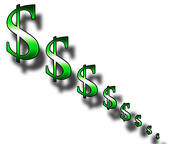By Barry Eichengreen
The dollar doesn’t have much clout these days. The greenback has lost 12 percent of its value against foreign currencies since the chaotic period after the failure of Lehman Brothers in 2008, and nearly 5 percent since the end of 2010.
 Economists are debating the end of the era of the dollar, while news organizations paint it as a 98-pound weakling. Our so-called “fiat” currency, backed only by the full faith and credit of the government, no longer commands respect. So wouldn’t we be better off without it?
Economists are debating the end of the era of the dollar, while news organizations paint it as a 98-pound weakling. Our so-called “fiat” currency, backed only by the full faith and credit of the government, no longer commands respect. So wouldn’t we be better off without it?
Imagine you woke up tomorrow and the dollar had vanished. The Federal Reserve was out of the business of supplying money. How would you go about your affairs?
The obvious answer is that life would become one big swap meet. It would be like your local farmers market, except that instead of a vendor selling carrots in exchange for dollars, she would have to trade them for the onions in the neighboring stall or for the paring knife of the cook with no vegetables at all. The problem with this is what economists call “non-coincidence of wants” — the carrot seller may not want onions, and those onions may rot before she finds someone who does.
This highlights the convenience of currency as a medium of exchange and a store of value. It follows that in a world where the United States no longer had a currency, there would be an incentive to use someone else’s.
Just look to our history. Britain’s 13 North American colonies were prohibited from operating a mint or otherwise coining money. So the colonists turned to Spanish silver coin, which they obtained by exporting dried fish and whale oil to the West Indies. Were the dollar to magically disappear, Americans would again resort to using other monies. When Ron Paul says “end the Fed,” he presumably doesn’t realize that he would be giving a valuable franchise to the Bank of Canada.
Realistically, our currency needs could be met only by another large economy, and Canada might be too small an issuer of currency. But the only other potential candidates — Europe and China — both have drawbacks. Europe is bogged down in a debt crisis, while China limits the use of its currency abroad partly to prevent its exchange rate from rising.
So imagine instead that we do not start using another country’s money. Figuring out how many carrots to offer for an onion, how many onions to offer for a potato and how many potatoes to offer for a paring knife would be complicated without a common measuring rod. We would therefore gravitate to one commodity as the standard by which the value of all other commodities was expressed.
In colonial Virginia, tobacco initially served this purpose. The next step was to settle transactions using not actual tobacco but warehouse receipts for stored tobacco. This was more convenient, but it was also riskier. The operators of the warehouse had an incentive to issue more receipts — to themselves, of course — than they had tobacco in storage. As a result, Virginia’s tobacco warehouses were highly regulated, and the penalty for issuing fraudulent receipts was death.
It might not work, and might create more problems than we already have. How?
Read the rest of the article on Page 2
- Please click LIKE at the top.
- Share with your friends, click share below.
- Leave a comment.
- Thanks!
- Donna Calvin, The Word Warriorette
- Proclaiming Warning to a Sleeping Nation

